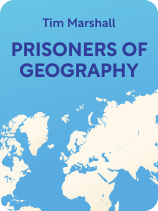

This article is an excerpt from the Shortform book guide to "Prisoners of Geography" by Tim Marshall. Shortform has the world's best summaries and analyses of books you should be reading.
Like this article? Sign up for a free trial here.
How does global warming impact geopolitics? Why are new trade routes both a blessing and a curse?
Climate change impacts geography. In turn, geography impacts politics and economics. Tim Marshall discusses this fascinating and important link in his book Prisoners of Geography.
Keep reading to understand the connection between geography and climate change.
Geography and Climate Change
Since the massive advancements in technology that came with the Industrial Revolution, human behavior has contributed to climate change. As Marshall notes, climate change is actively changing the geography and politics of the world.
To explain this link between geography and climate change, Marshall discusses the new trade routes that have opened as polar ice has receded. New sea routes north of both Russia and North America are now open for several months a year, allowing for cheaper trade. As more new routes open up, the nations that use them will vie for control of these areas.
More worryingly, as new trade routes open thanks to global warming, coastal economic centers worldwide are in increasing danger of flooding as the geography of the coasts changes.
| Global Warming and Geopolitics Experts note that we’ve only begun to experience the many, far-reaching effects of climate change on geography and geopolitics. As the world transitions away from fossil fuels, nations that rely on oil to fuel their economies will be put in weakened economic positions. Furthermore, in addition to the new Arctic shipping lanes Marshall describes, computer modeling suggests that new routes between China and the Eastern United States may soon open. With each new route that opens, the political struggle for control of the Arctic will intensify. Lastly, as coastal cities and nations begin to flood, researchers predict that a wave of mass migrations will occur. These researchers predict that as many as 200 million climate refugees will be forced to move by 2050. In addition to the pain and suffering endured by those who will lose their homes to climate change, there will also be massive political and economic implications for the many countries that will house those refugees. |

———End of Preview———
Like what you just read? Read the rest of the world's best book summary and analysis of Tim Marshall's "Prisoners of Geography" at Shortform.
Here's what you'll find in our full Prisoners of Geography summary:
- Why some nations thrive and others struggle with poverty and inequality
- How a nation's geography determines its fate
- Why nations are always preparing for international conflict






